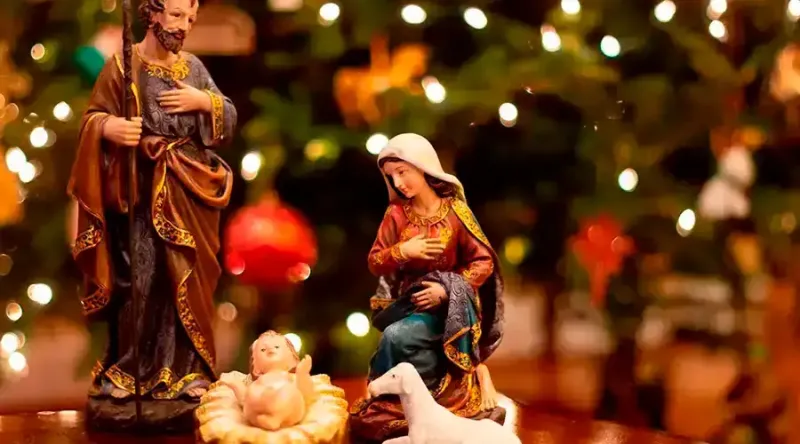
ACI Prensa Staff, Nov 8, 2022 / 09:24 am (CNA).
The Mexican Bishops’ Conference defended the presence of Christian symbols on public property in light of a case coming before the Supreme Court of Justice of the Nation in which the plaintiff is seeking to prohibit Nativity scenes on the streets of a town hall in Yucatan.
On Nov. 9, the First Chamber of the Supreme Court of Justice of the Nation (SCJN) will study a legal challenge that seeks to prohibit the placement of “decorative objects in allusion to the ‘birth of Jesus Christ’ on public property in the months of December and January.”
The nongovernmental organization Kanan Derechos Humanos (Kanan Human Rights), which filed the lawsuit, describes itself as “a group of young people who in 2019, faced with the multiple presence of social injustices, joined forces to create strategies for the promotion and defense of human rights in the Yucatan Peninsula.” One of its avenues of action is “strategic litigation.”
The lawsuit is directed against the Chocholá city council in the state of Yucatán. However, if the plaintiff wins it would set a precedent for banning these symbols across the country.
The president of the National Front for the Family, Rodrigo Iván Cortés, told ACI Prensa, CNA’s Spanish-language sister news agency, that if the court rules against the city council it would also affect the presence of images of Our Lady of Guadalupe and others on the streets of Mexico.
The Mexican bishops issued a statement Nov. 6 requesting that the Supreme Court justices assess the effects that a ruling in favor of the lawsuit would have on the right to religious freedom.
In their statement, the conference noted that Article 18 of the Universal Declaration of Human Rights recognizes the right to religious freedom and its expression “both in public and in private.”
The bishops pointed out that a true secular state supposes the protection of this right, allowing “the freedom to believe or not believe, even to change one’s creed or fundamental choices.”
The bishops recalled that in Mexico, particularly in the first half of the last century, “an extremely intolerant political current wanted to prohibit the exercise, not only public, but also private, of religious freedom, as well as worship.”
The religious persecution that occurred during those years “was a manifestation of an authoritarian and mistaken vision of the role of the State, which doesn’t have jurisdiction over a person’s inner self, that is, their conscience.”
“The Secular State,” the conference said, “cannot be understood as the absence, the false neutrality toward religion. The elimination of any religious sign already supposes the affirmation ‘of unbelief.’ This position has been shaping the ‘secularist’ tendency, increasingly extended in the modern world.”
The bishops explained to the SCJN that religious beliefs “have concrete manifestations that cannot be denied” because these are not an idea, “but a choice, a way of life, which becomes a culture.”
The Mexican Bishops’ Conference pointed out that “trying to impose a society without religious referents is, implicitly, wanting a single lifestyle, nonreligious, that is, where the denial of religious beliefs prevails.”
“This model discriminates against human beings who do make religious choices and is contrary to the Secular State. It’s absurd to seek to eliminate all public manifestations of religious life. Public funds, even in democratic countries, must be at the service of the people, and these have religious orientations,” the conference said.
In their statement, the bishops affirmed that the Church doesn’t seek privileges, “but we do recognize that our identity has multiple positive aspects that have enriched the culture and tradition of our Mexican People.”
The conference thus asked the members of the SCJN “to assess these points and think about the terrible contradictions that would be created by voting in favor on an issue of this nature.”
“Mexico needs unity, peace. These arise from encountering our lives beyond merely instrumental values. Let us open up ways, together, for dialogue and encounter, in the search for common sense, guided by the deepest values of every human being,” the bishops said.
This story was first published by ACI Prensa, CNA’s Spanish-language news partner. It has been translated and adapted by CNA.
If you value the news and views Catholic World Report provides, please consider donating to support our efforts. Your contribution will help us continue to make CWR available to all readers worldwide for free, without a subscription. Thank you for your generosity!
Click here for more information on donating to CWR. Click here to sign up for our newsletter.





Leave a Reply